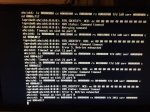I recently had to upgrade my old freenas 8 box as the motherboard died, so I replaced the mobo/cpu/ram/ps/freenas version with this:
Asrock Z97 Extreme6
Intel Pentium G3220 Haswell Dual-Core 3.0 GHz LGA 1150 54W
G.SKILL Ripjaws X Series 16GB (2 x 8GB) 240-Pin DDR3 SDRAM DDR3 1600
Corsair CX750M Power Supply
FreeNAS-9.10-STABLE-201606270534 (dd17351)
I kept my original 8 2-TB Seagate 7200 rpm SATA drives.
I realize that the board and RAM are not optimal for freenas, but the board had 10 SATA ports and I was in a time crunch and it was quickly available. I was booting my original freenas setup from an old OCZ USB stick, and it booted back up quickly, with no errors with the new hardware, but the onboard NICs were not recognizes in freenas 8. So, I grabbed a larger 16GB Sandisk Cruzer USB stick and installed FreeNAS 9.10-STABLE from a DVD. Now, the problem is, FreeNAS DOES boot up, but it takes roughly 20-25 minutes to do so and gets CAM Status errors during the whole process. Screenshot below.
I tried a couple of different USB sticks and even a Western Digital USB drive, but nothing changes. 20 minute boot time with those errors. But, once it boots up, everything works fine. I was able to import my old volumes and set up a Plex jail no problem. Transfer rates are excellent. I am currently booting freenas from the WD 120gb USB drive. So, is there anything I can do or should I just accept the massive boot time and go with it? I mean, things seem to be great once it boots up, but those errors make me question if it's truly stable or not. I appreciate any suggestions.
Asrock Z97 Extreme6
Intel Pentium G3220 Haswell Dual-Core 3.0 GHz LGA 1150 54W
G.SKILL Ripjaws X Series 16GB (2 x 8GB) 240-Pin DDR3 SDRAM DDR3 1600
Corsair CX750M Power Supply
FreeNAS-9.10-STABLE-201606270534 (dd17351)
I kept my original 8 2-TB Seagate 7200 rpm SATA drives.
I realize that the board and RAM are not optimal for freenas, but the board had 10 SATA ports and I was in a time crunch and it was quickly available. I was booting my original freenas setup from an old OCZ USB stick, and it booted back up quickly, with no errors with the new hardware, but the onboard NICs were not recognizes in freenas 8. So, I grabbed a larger 16GB Sandisk Cruzer USB stick and installed FreeNAS 9.10-STABLE from a DVD. Now, the problem is, FreeNAS DOES boot up, but it takes roughly 20-25 minutes to do so and gets CAM Status errors during the whole process. Screenshot below.
I tried a couple of different USB sticks and even a Western Digital USB drive, but nothing changes. 20 minute boot time with those errors. But, once it boots up, everything works fine. I was able to import my old volumes and set up a Plex jail no problem. Transfer rates are excellent. I am currently booting freenas from the WD 120gb USB drive. So, is there anything I can do or should I just accept the massive boot time and go with it? I mean, things seem to be great once it boots up, but those errors make me question if it's truly stable or not. I appreciate any suggestions.

